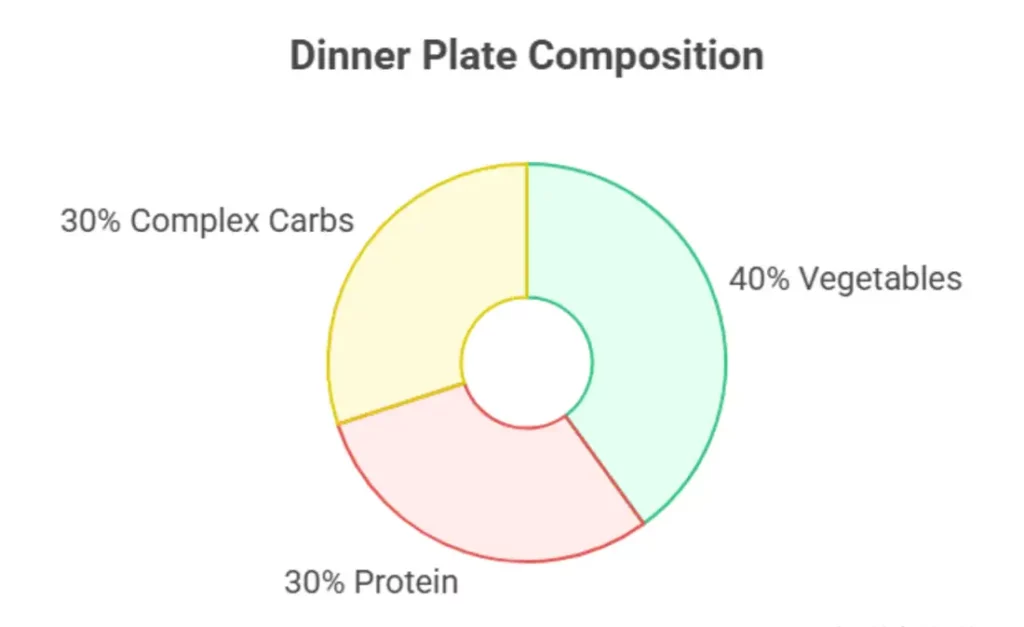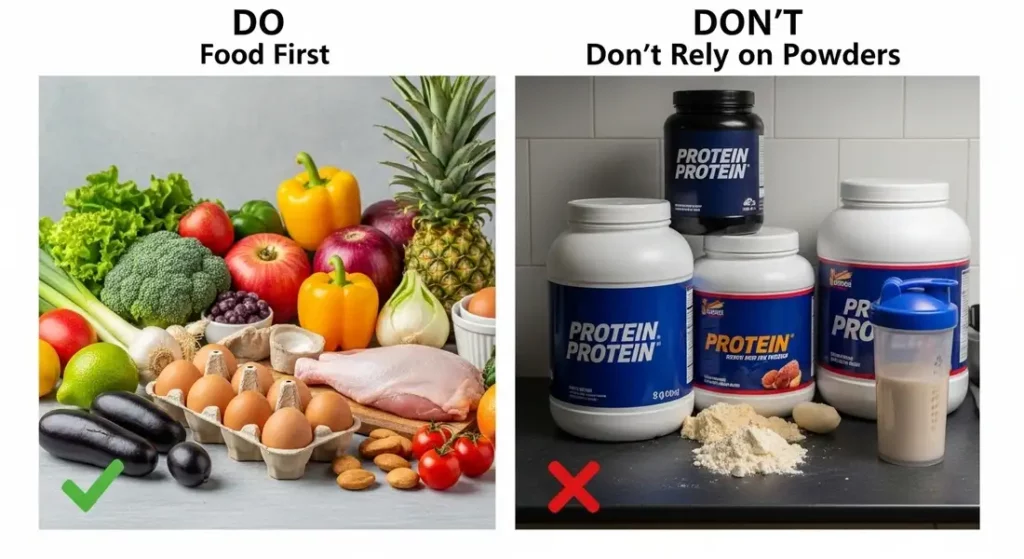You can follow the most perfectly structured workout plan in the world, but without the right fuel, your efforts will fall flat.
Think of it this way: your workout is the architect’s blueprint, but nutrition provides the raw materials—the bricks, mortar, and steel—to actually build the structure.

Many beginners get intimidated by nutrition, thinking they need to follow a complex, restrictive diet.
But it doesn’t have to be that way.
As we highlight in our Ultimate Beginner’s Guide, mastering a few simple principles is all it takes to provide your body with the fuel it needs to repair, rebuild, and grow stronger.
The King of Muscle Growth – Protein
If you only focus on one thing in your diet, make it protein. Protein is made up of amino acids, which are the literal building blocks of muscle tissue.
When you work out, you create tiny tears in your muscle fibers.
Protein is what your body uses to repair those tears and rebuild them stronger than before.
Without enough protein, your body simply cannot complete this process effectively.
It’s like asking a construction crew to build a house without any bricks.
How Much Protein Do You Need?
A simple guideline for active individuals looking to build muscle is to aim for around 0.7-1.0 grams of protein per pound of your body weight (or 1.6-2.2 grams per kilogram).
For a 150-pound person, this would be roughly 105-150 grams of protein per day.
Don’t stress about hitting the number perfectly. Just focus on including a solid source of protein with every meal.
Excellent Sources of Protein:
- Lean Meats: Chicken breast, turkey, lean beef
- Fish: Salmon, tuna, cod
- Dairy: Greek yogurt, cottage cheese, milk
- Eggs: A nutritional powerhouse
- Legumes: Lentils, chickpeas, black beans
- Tofu and Edamame

The Supporting Cast – Carbs and Fats
While protein is the star, carbohydrates and fats play crucial supporting roles.
- Carbohydrates (Carbs): Carbs are your body’s primary energy source. They provide the fuel you need to perform your workouts with intensity. Without enough carbs, you’ll feel sluggish and weak. Focus on complex carbohydrates that provide sustained energy.
- Good Sources: Oats, brown rice, quinoa, sweet potatoes, fruits, and vegetables.
- Fats: Healthy fats are essential for hormone production (including hormones vital for muscle growth), brain function, and overall health.
- Good Sources: Avocados, nuts, seeds, olive oil.
Putting It All Together – A Sample Meal Structure
Don’t overthink it.
A balanced plate for muscle growth is simple.
At each meal, try to build your plate with this model in mind:
- Start with Protein: Make a palm-sized portion of a quality protein source the star of your meal.
- Add Complex Carbs: Fill about a quarter of your plate with a source of healthy carbs to fuel your energy.
- Fill the Rest with Veggies: Load up the remainder of your plate with vegetables for essential vitamins, minerals, and fiber.
- Include a Healthy Fat: Add a thumb-sized portion of healthy fats, like a sprinkle of nuts or a drizzle of olive oil.
- Drink Water: Staying hydrated is crucial for performance and recovery. Aim to drink water consistently throughout the day.

Top 3 Nutrition Mistakes Beginners Make
Navigating nutrition is often where beginners get tripped up.
Here are the most common pitfalls to avoid.
- Not Eating Enough (Under-fueling): Building muscle requires energy. Many people start working out but fail to increase their food intake to match their new activity level. If you’re in too large of a calorie deficit, your body won’t have the resources it needs to build new muscle tissue.
- Fearing Carbs: In the age of low-carb diets, many beginners mistakenly cut out this vital nutrient. Carbs are not the enemy; they are the fuel for your workouts. Cutting them too low will sabotage your energy levels and performance.
- Focusing on Supplements Over Real Food: Protein powders can be a convenient way to supplement your intake, but they should never be the foundation of your diet. Your priority should always be getting your nutrients from whole, unprocessed foods. You can’t out-supplement a poor diet.

Keep It Simple and Sustainable
Your diet shouldn’t feel like a punishment.
Focus on consistently eating whole, nutrient-dense foods, prioritizing protein, and staying hydrated.
This simple approach, combined with your consistent training, is the proven recipe for success.
With your body properly fueled, the final piece of the puzzle is giving it the time it needs to rest and grow.
Next Step: Rest and Recovery – Why It’s Crucial for Beginners
